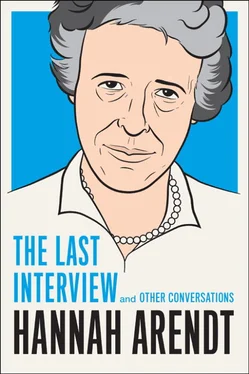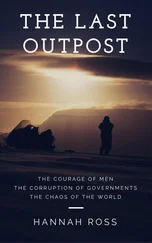I myself, for example, don’t believe that I have ever considered myself a German—in the sense of belonging to the people as opposed to being a citizen, if I may make that distinction. I remember discussing this with Jaspers around 1930. He said, “Of course you are German!” I said, “One can see that I am not!” But that didn’t bother me. I didn’t feel that it was something inferior. That wasn’t the case at all. And to come back once again to what was special about my family home: all Jewish children encountered anti-Semitism. And it poisoned the souls of many children. The difference with us was that my mother was always convinced that you mustn’t let it get to you. You have to defend yourself! When my teachers made anti-Semitic remarks—mostly not about me, but about other Jewish girls, eastern Jewish students in particular—I was told to get up immediately, leave the classroom, come home, and report everything exactly. Then my mother wrote one of her many registered letters; and for me the matter was completely settled. I had a day off from school, and that was marvelous! But when it came from children, I was not permitted to tell about it at home. That didn’t count. You defended yourself against what came from children. Thus these matters never were a problem for me. There were rules of conduct by which I retained my dignity, so to speak, and I was protected, absolutely protected, at home.
GAUS:You studied in Marburg, Heidelberg, and Freiberg with professors Heidegger, Bultmann, and Jaspers; with a major in philosophy and minors in theology and Greek. How did you come to choose these subjects?
ARENDT:You know, I have often thought about that. I can only say that I always knew I would study philosophy. Ever since I was fourteen years old.
GAUS:Why?
ARENDT:I read Kant. You can ask, Why did you read Kant? For me the question was somehow: I can either study philosophy or I can drown myself, so to speak. But not because I didn’t love life! No! As I said before—I had this need to understand… The need to understand was there very early. You see, all the books were in the library at home; one simply took them from the shelves.
GAUS:Besides Kant, do you remember special experiences in reading?
ARENDT:Yes. First of all, Jaspers’s Psychologie der Weltanschauungen ( Psychology of Worldviews ), published, I believe, in 1920. [§] Karl Jaspers’s Psychologie der Weltanschauungen was first published in Berlin in 1919.
I was fourteen. Then I read Kierkegaard, and that fit together.
GAUS:Is this where theology came in?
ARENDT:Yes. They fit together in such a way that for me they both belonged together. I had some misgivings only as to how one deals with this if one is Jewish… how one proceeds. I had no idea, you know. I had difficult problems that were then resolved by themselves. Greek is another matter. I have always loved Greek poetry. And poetry has played a large role in my life. So I chose Greek in addition. It was the easiest thing to do, since I read it anyway!
GAUS:I am impressed!
ARENDT:No, you exaggerate.
GAUS:Your intellectual gifts were tested so early, Miss Arendt. Did it sometimes separate you as a schoolgirl and as a young student from the usual day-to-day relationships, painfully perhaps?
ARENDT:That would have been the case had I known about it. I thought everybody was like that.
GAUS:When did you realize you were wrong?
ARENDT:Rather late. I don’t want to say how late. I am embarrassed. I was indescribably naive. That was partly due to my upbringing at home. Grades were never discussed. That was taken to be inferior. Any ambition was taken to be inferior. In any case, the situation wasn’t at all clear to me. I experienced it sometimes as a sort of strangeness among people.
GAUS:A strangeness which you believed came from you?
ARENDT:Yes, exclusively. But that has nothing to do with talent. I never connected it with talent.
GAUS:Was the result sometimes disdain for others in your youth?
ARENDT:Yes, that happened. Very early. And I have often suffered because I felt such disdain, that is, knowing one really shouldn’t, and one really must not, and so forth.
GAUS:When you left Germany in 1933, you went to Paris, where you worked in an organization that tried to provide for Jewish youngsters in Palestine. Can you tell me something about that?
ARENDT:This organization brought Jewish youngsters between thirteen and seventeen from Germany to Palestine and housed them there in kibbutzim. For this reason, I really know these settlements pretty well.
GAUS:And from a very early period.
ARENDT:From a very early period; at that time I had a lot of respect for them. The children received vocational training and retraining. Sometimes I also smuggled in Polish children. It was regular social work, educational work. There were large camps in the country where the children were prepared for Palestine, where they also had lessons, where they learned farming, where they above all had to gain weight. We had to clothe them from head to foot. We had to cook for them. Above all, we had to get papers for them, we had to deal with the parents—and before everything else we had to get money for them. That was also largely my job. I worked together with French women. That is more or less what we did. Do you want to hear how I decided to take on this work?
GAUS:Please.
ARENDT:You see, I came out of a purely academic background. In this respect the year 1933 made a very lasting impression on me. First a positive one and then a negative one. Perhaps I had better say first a negative one and then a positive one. People often think today that German Jews were shocked in 1933 because Hitler assumed power. As far as I and people of my generation are concerned, I can say that that is a curious misunderstanding. Naturally Hitler’s rise was very bad. But it was political. It wasn’t personal. We didn’t need Hitler’s assumption of power to know that the Nazis were our enemies! That had been completely evident for at least four years to everyone who wasn’t feebleminded. We also knew that a large number of the German people were behind them. That could not shock us or surprise us in 1933.
GAUS:You mean that the shock in 1933 came from the fact that events went from the generally political to the personal?
ARENDT:Not even that. Or, that too. First of all, the generally political became a personal fate when one emigrated. Second… friends “coordinated” or got in line. The problem, the personal problem, was not what our enemies did but what our friends did. In the wave of Gleichschaltung (coordination), [‖] Gleichschaltung , or political co-ordination, refers to the widespread giving in, at the outset of the Nazi era, to the changed political climate in order either to secure one’s position or to get employment. In addition, it describes the Nazi policy of converting traditional organizations—youth groups and all sorts of clubs and associations—into specifically Nazi organizations.
which was relatively voluntary—in any case, not yet under the pressure of terror—it was as if an empty space formed around one. I lived in an intellectual milieu, but I also knew other people. And among intellectuals Gleichschaltung was the rule, so to speak. But not among the others. And I never forgot that. I left Germany dominated by the idea—of course somewhat exaggerated: Never again! I shall never again get involved in any kind of intellectual business. I want nothing to do with that lot. Also I didn’t believe then that Jews and German Jewish intellectuals would have acted any differently had their own circumstances been different. That was not my opinion. I thought that it had to do with this profession, with being an intellectual. I am speaking in the past tense. Today I know more about it…
Читать дальше












